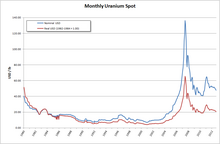
The Uranium One controversy involves various conspiracy theories promoted by conservative media, politicians, and commentators that characterized the sale of the uranium mining company Uranium One to the Russian state-owned corporation Rosatom as a $145 million bribery scandal involving Hillary Clinton and the Clinton Foundation.[1][2][3] No evidence of wrongdoing was ever found.[2]
Since the 2015 publication of the book Clinton Cash by Breitbart News editor and Steve Bannon collaborator Peter Schweizer, as well as a 2015 New York Times article that used some of Schweizer's raw research,[4] allegations of a bribery scheme involving Hillary Clinton, the Clinton Foundation and the 2010 sale of Uranium One persisted, primarily in conservative media. Fox News host Sean Hannity characterized it as "the biggest scandal — or, at least, one of them — in American history," while his frequent guest and former Trump advisor Seb Gorka equated it with treason worthy of a death sentence.[5]
Despite four years of discussion and analysis of the matter—as well as an FBI investigation[6]—no evidence of any quid pro quo or other wrong-doing surfaced. Numerous Republican politicians and pundits, including President Donald Trump, insisted that the Clinton-Uranium One story was the "real" Russian scandal, rather than the matters for which the Trump administration was investigated.[7][8][9] The Washington Post reported in January 2020 that an additional Justice Department investigation into the matter, initiated after Donald Trump took office in 2017, was winding down after finding nothing worth pursuing.[10]
- ^ Benkler, Yochai; Faris, Robert; Roberts, Hal (September 17, 2018). Network Propaganda: Manipulation, Disinformation, and Radicalization in American Politics. Oxford University Press. p. 167. ISBN 978-0-19-092364-8 – via Google Books.
- ^ a b Rutledge, Paul E.; Rackaway, Chapman (July 16, 2021). The Unorthodox Presidency of Donald J. Trump. University Press of Kansas. p. 43. ISBN 978-0-7006-3232-9 – via Google Books.
- ^ Dagnes, Alison (March 12, 2019). "Negative Objectives: The Right-Wing Media Circle and Everyone Else". Super Mad at Everything All the Time. Cham: Springer International Publishing. pp. 167–217. doi:10.1007/978-3-030-06131-9_5. ISBN 978-3-030-06131-9 – via Springer Link.
- ^ Becker, Jo; McIntire, Mike (April 23, 2015). "Cash Flowed to Clinton Foundation Amid Russian Uranium Deal". The New York Times. Retrieved March 31, 2018 – via NYTimes.com.
- ^ Borchers, Callum. "Analysis | In Trump world, the uranium deal approved by Clinton is 'Watergate' and worthy of 'the chair'" – via www.washingtonpost.com.
- ^ Apuzzo, Matt; Schmidt, Michael S.; Goldman, Adam; Rashbaum, William K. (November 1, 2016). "F.B.I.'s Email Disclosure Broke a Pattern Followed Even This Summer". The New York Times. Retrieved March 31, 2018 – via NYTimes.com.
- ^ Lockie, Alex (September 17, 2017). "Trump rants at 'Fake Media' for ignoring stories on Russia uranium deal tied to Clinton". Business Insider. Retrieved October 24, 2018.
- ^ Savransky, Rebecca (October 19, 2017). "Trump: Uranium deal with Russia 'biggest story that Fake Media doesn't want to follow'". The Hill. Retrieved October 24, 2018.
- ^ Borchers, Callum (October 24, 2017). "Analysis | Making sense of Russia, Uranium One and Hillary Clinton, as Congress opens an investigation". Washington Post. Retrieved October 24, 2018.
- ^ Barrett, Devlin; Zapotosky, Matt (January 9, 2020). "Justice Dept. winds down Clinton-related inquiry once championed by Trump. It found nothing of consequence". Washington Post.